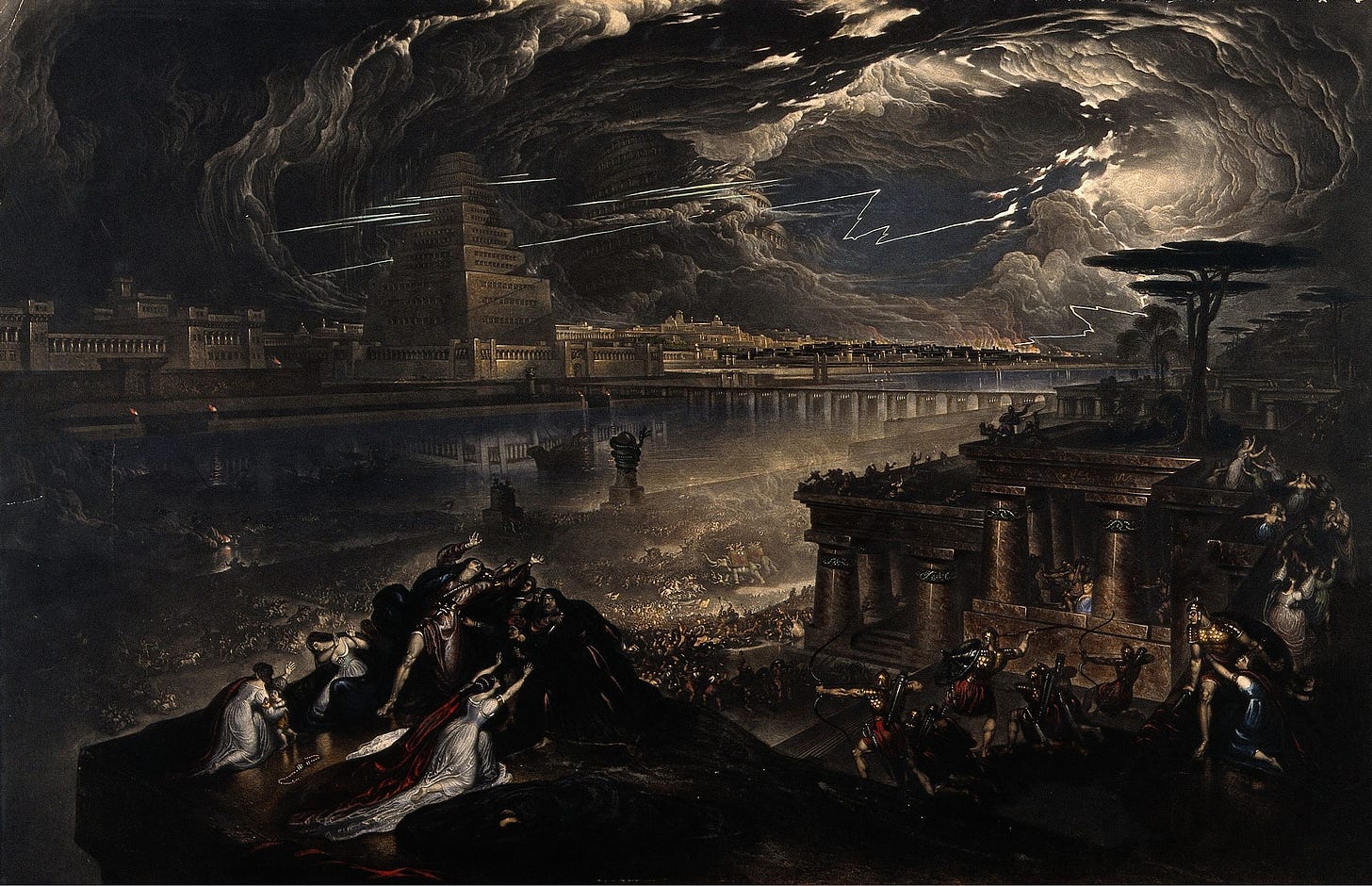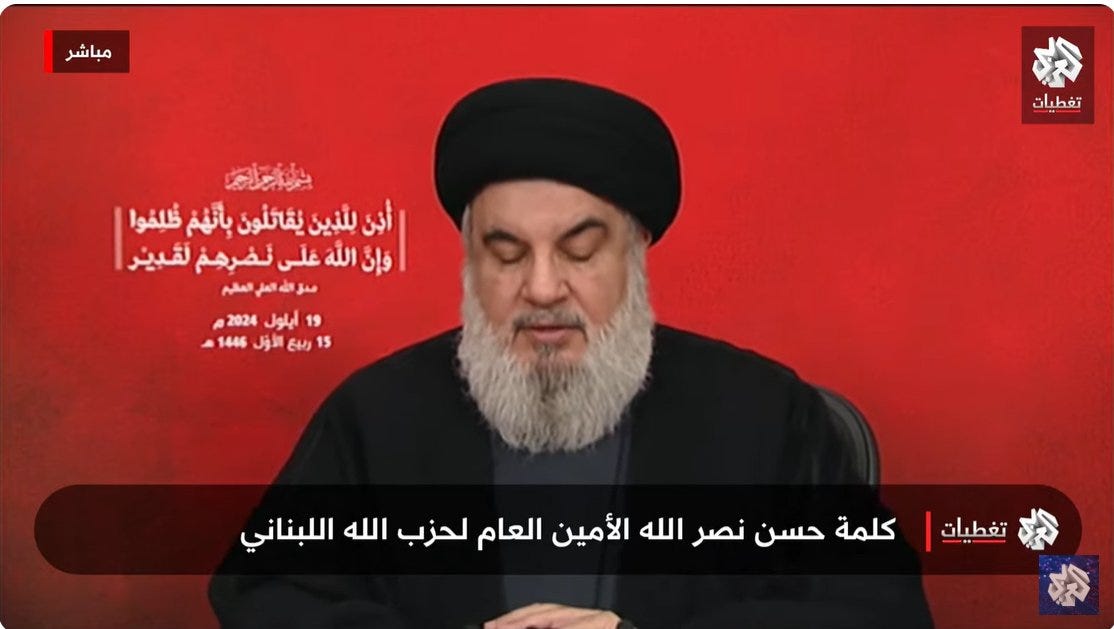
Note: I'm excited to share that my blog reached the milestone of 1,000 subscribers today! I want to extend my heartfelt thanks to all of you for reading my blog. Thank you for your e-mails, feedback, support, and suggestions. A special thanks goes to my loved ones, who inspired me to start writing again and encouraged me to revive this blog. I am truly honored that you’ve chosen to engage with my thoughts, musings, and ideas. Thank you all once again!
In my previous newsletter, I highlighted Israel's execution of one of the most sophisticated and complex sabotage operations in modern warfare: direct targeting of Hezbollah's communications systems, paired with a stark warning to their operatives. The message Israel intended to send was clear: Do not mess with us. Do not test our resolve.
However, Hezbollah’s Secretary-General, Hassan Nasrallah, chose to ignore Israel’s warnings. His most recent speech was particularly noteworthy, as he acknowledged the setback: 'Without a doubt, we have faced a tremendous security challenge, unprecedented in the history of Lebanon's resistance movement.
In reality, Israel's sabotage operation was so humiliating for Hezbollah that Nasrallah repeatedly attempted to save face by downplaying the damage, claiming, 'Israel wanted to kill 5,000 Hezbollah operatives, but thankfully they killed fewer.' Faced with two options—accept defeat or escalate—Nasrallah chose the latter and decided to escalate by threatening Israel’s Northern borders.
Instead of engaging in a tit-for-tat game, Jerusalem opted to directly target Iran’s key figure. The result was that Israel successfully crippled Iran’s most important partner. Many assumed this would be enough to force Iran to back down, but yesterday’s events proved otherwise.
The October 1st attack bore many similarities to the one in April, though this time Iran’s posture has notably shifted.
Firstly, Hezbollah, Iran's most prized and sophisticated proxy, has been significantly weakened. This complicates any coordination of attacks from Lebanon and Syria against Israel.
Secondly, as seen last year, Iran is facing significant domestic challenges. The Islamic Republic struggles to appeal to its younger generation and offers few economic prospects. Its discriminatory practices towards ethnic minorities have pushed Tehran to intensify its rhetoric, blaming the "Zionist" threat for its internal woes.
Lastly, Israel's sabotage operations, targeting not just Hezbollah but also the Houthis (with the killing of Houthi leader Mohammad Abdul Salam) and Hamas (with the assassination of Ismail Haniyeh), have likely increased the regime's sense of paranoia. When I check on Arab media, both pro and anti-Iran, I have also noticed that one of the main concerns revolves around Iran being no longer reliable as a sponsor for "Jihad against Zionists and their supporters (meaning Sunni countries)."
By taking a step back, it becomes evident that Iran is in a position of weakness. However, it is precisely this vulnerability that makes it more threatening. Although its attacks may not be devastating, they can still achieve significant political objectives. To understand this, one must consider the regime's nature and priorities.
Since October 7, Iran has pursued three objectives: 1) asserting dominance over the Palestinian issue, 2) expanding and arming its network of proxies, as seen with the Houthis, and 3) compensating for its technological shortcomings by deepening cooperation with China and Russia, particularly in the development and acquisition of disruptive military capabilities.
These short-term goals are designed to ensure Iran can seize opportunities as they arise. In this context, Iran has applied maximum pressure on U.S. allies, while also challenging U.S. influence, as demonstrated in the Red Sea, where the Houthis have successfully disrupted a vital trade route through which $1 trillion worth of goods passes.
While Israel and other U.S. allies have successfully hindered Iran from achieving its short-term objectives, this does not mean that Iran believes it is straying from what it considers "the right path."
The regime is not centered around individuals or figures; instead, the people serve the regime's interests. Iran continues to sign significant agreements with Russia and China, asserts dominance over the Palestinian issue to gain influence in the Arab and Muslim world, and uses proxies as distractions while quietly advancing its nuclear weapons program.
For the Islamic Republic, anything that serves as a distraction is valuable—even a low-impact attack on Israel with minimal casualties. Why? Because in Iran's calculations, the response from the White House matters more than that from Jerusalem.
Iran's attack in April, followed by a recent barrage of 200 ballistic missiles, without facing significant repercussions from Washington, is seen as a victory in Tehran.
Iran recognizes that it cannot effectively defeat Israel or "restore deterrence"—something it barely possesses—but it understands that the Biden administration, like Obama's, operates under the assumption that a diplomatic solution with the Islamic Republic is possible, despite Iran’s strategic objective of opposing the United States.
This administration views Israel as a potential obstacle to a nuclear agreement with Iran. As a result, Iran is carefully positioning itself to influence U.S. policy, provoking Israel at every opportunity while counting on Washington to restrain Israeli responses.
While Tehran appears to be playing a clever game, betting on U.S. restraint and its reluctance to engage deeply in the Middle East, it is underestimating Israel's willingness to defy Washington’s preferences.
If there’s one lesson from Hamas' October 7 attacks, it’s that Israel has experienced firsthand the consequences of relying on a U.S. strategy that accommodates Iran. It is increasingly unlikely that Jerusalem will make the same mistake again. Iran's regional integration directly threatens Israel’s security, not to mention the risk posed by its pursuit of nuclear weapons.
Tehran may believe that its low-cost operations with high political returns are succeeding, but it is mistaken in thinking it is still dealing with the same Israel as before.
Thank you for reading and for your support.





Thanks for the insights; always welcome.
Do you think civil war in Iran is a possibility?